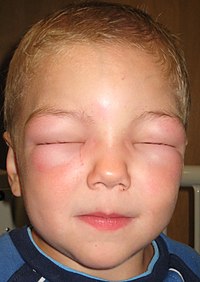
Photo from wikipedia
Acquired angioedema due to C1 inhibitor deficiency (C1-INH-AAE) is a rare disease characterized by adult-onset recurrent non-urticarial angioedema with low levels of C1-INH. It is associated with lymphoproliferative disorders, and… Click to show full abstract
Acquired angioedema due to C1 inhibitor deficiency (C1-INH-AAE) is a rare disease characterized by adult-onset recurrent non-urticarial angioedema with low levels of C1-INH. It is associated with lymphoproliferative disorders, and treatments are off-label with variable success. We conducted a systematic literature review to include patients with C1-INH-AAE identified in PubMed and Embase databases between January 2006 and February 2021. Clinical features of these patients were summarized, and factors associated with disease remission were explored. A total of 121 patients were included in the current study with a median age at diagnosis of 64 years and 45.5% being male. An associated disease was recorded in 94 patients (77.7%), and lymphoproliferative disorder was the most reported (59/94, 62.8%). Anti-C1-INH autoantibodies were present in 45 of 71 patients (63.4%). Factors impacting disease remissions included age (odds ratio [OR] 0.951, 95% confidence interval [CI] 0.909-0.994, p = 0.027), male (OR 0.327, 95% CI 0.124-0.866, p = 0.025), presence of monoclonal gammopathy (OR 0.133, 95% CI 0.041-0.429, p = 0.001), requirement of specific on-demand treatment (OR 0.216, 95% CI 0.066-0.709, p = 0.012) and rituximab use (OR 2.865, 95% CI 1.038-7.911, p = 0.042). A total of nine patients (7.4%) died at last follow up and most were unrelated to C1-INH-AAE. Our results imply that C1-INH-AAE is primarily associated with underlying B or plasma cell abnormalities, and clone-directed therapies could be promising options for its long-term management.
Journal Title: Clinical immunology
Year Published: 2021
Link to full text (if available)
Share on Social Media: Sign Up to like & get
recommendations!